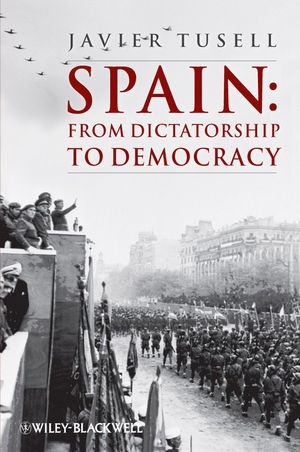Read more
Informationen zum Autor Javier Tusell was Professor of Contemporary History at the National University of Distance Learning (UNED). Best known as a historian of contemporary Spain, he published more than 50 books on the subject in his lifetime. During an early foray into politics, he negotiated the return to Spain of Picasso's anti-war masterpiece, Guernica , and was elected UCD councillor for Madrid in 1979. Latterly he became a respected media commentator on Spanish history and especially the Franco dictatorship. Translator Rosemary Clark , college lecturer at Downing College, is an affiliated lecturer in Spanish at the University of Cambridge specializing in Modern Peninsular Spanish literature, history, and culture. Particular interests are post-colonialism, Spain and Africa, religious issues, and regionalism. Klappentext The end of the Spanish Civil War marked a critical fracture in the modernization of Spain. When the last Republicans surrendered in early 1939, General Franco assumed dictatorial control. This book charts Spain's development under Franco and its subsequent transition to democracy up to the present day. Completed by Javier Tusell just weeks before his untimely death, it is the final work by Spain's most distinguished contemporary historian. Spain: From Dictatorship to Democracy provides full coverage of the country's political, social, and economic transformation. It also traces developments in popular culture and the arts. Beginning with an introductory overview of Franco and Francoism, the book is organized chronologically, detailing each period's most significant developments. Javier Tusell addresses such issues as Spain's relations with the protectorate of Morocco, fascism and isolationism, the reaffirmation of regional identity and the rise of the popular media. He also provides a context for understanding the continuing tensions between democracy and terrorism, including the effects of the 2004 Madrid Bombings. A thorough introduction to post-Civil War Spain, this book is essential reading for all those interested in Franco and the legacy of his repressive regime. Zusammenfassung * * A thorough introduction to post-Civil War Spain, from its development under Franco and subsequent transition to democracy up to the present day * Tusell was a celebrated public figure and historian. Inhaltsverzeichnis Note on the Author viii Introduction 1 Franco: Biography and Political Practice 2 Francoism: A Form of Dictatorship 12 Victors and Vanquished: The Disasters of the Civil War and Repression 20 Exile and the Start of the Postwar Period in Spain 26 Bibliography 31 Notes 33 1 The Temptation of Fascism and the Will to Survive (1939 -51) 34 A Failed Attempt to Make Spain Fascist 35 The Temptation to Intervene and Internal Conflict (1940-2) 40 Stumbling Progress towards Neutrality (1942-5) 48 Cosmetic Change: Regime Politics between 1945 and 1951 58 Opposition from Survivors: The Spanish Left from 1939 to 1951 65 The Monarchist Alternative 72 Franco in Isolation 75 The "Dark Night": Autarchy and Rationing in the 1940s 82 Culture: Penance and Survival 92 Bibliography 102 Notes 106 2 The Years of Consensus: The High Point of the Regime (1951- 65) 107 The End of International Isolation: The Concordat and Pacts with the United States 108 Spain and Europe: Colonization of Morocco Ends 114 The Regime and the Opposition up to 1956 119 A New Political Opposition 128 For or against Falange: Political Life under the Regime between 1956 and 1965 136 The Easing of Autarchy and the Change in Economic Policy 147 From Political Opposition to Social Opposition 159 Culture in the Francoist Middle Period: The E...

